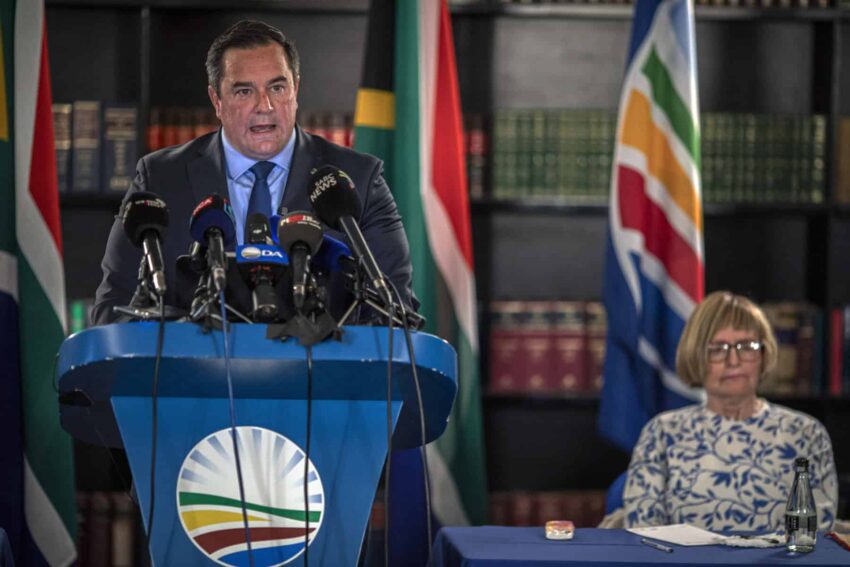
The DA faces a credibility crisis in the GNU, behaving more like an opposition party than a governing partner.
The government of national unity (GNU) has put the DA in a predicament.
The party finds itself in a growing credibility crisis – torn between wielding real power and preserving its opposition identity.
Last Wednesday’s axing of DA deputy minister of trade, industry and competition Andrew Whitfield has raised the constant question of whether the party can truly govern if it cannot commit?
This is worsened by the fact that the DA couldn’t follow through on its “48 hours or else…” ultimatum to President Cyril Ramaphosa after the firing of Whitfield.
Whitfield was dismissed following his unsanctioned trip to the US – a move reportedly made without executive approval.
The DA insists proper channels were followed, but the Presidency maintains there was a clear breach of protocol.
While the details of the incident may seem procedural, the fallout reveals a much deeper problem: the DA behaves less like a party in government and more like one eternally in opposition.
Instead of rallying to resolve the dispute internally, the DA responded by withdrawing from the National Dialogue, issuing sharp rebukes and hinting at broader political consequences.
The party’s tone remains adversarial – more befitting a faction trying to hold government to account than one trying to shape its direction from within. This division raises serious concerns about the DA’s role in the GNU.
ALSO READ: No party will pull out of the GNU, experts say
During Saturday’s media briefing – which turned out to be a damp squib as no divorce papers were served as expected – it became clear the DA was like someone who wants the benefits of a marriage, but won’t commit.
This person also wants to stay in the marriage for the sake of the children and prying relatives (in the DA’s case, for the sake of South Africans and business); so that they can keep an eye on the abusive and cheating spouse (in this case, the “corrupt” ANC).
But Minister in the Presidency Khumbudzo Ntshavheni made it plain that DA ministers, while appointed from party ranks, serve the national executive – not their political party. Public trust depends on this very fact.
When DA ministers serve as party spokespersons, denouncing government policies they are constitutionally bound to implement, they damage their credibility and that of the GNU.
The party does not agree with the national budget vote and it is currently vowing to vote against budgets of “corruption-accused ANC ministers” – including Human Settlements Minister Thembi Simelane and Higher Education and Training Minister Nobuhle Nkabane.
And, one wonders, if it is really interested in governing, rather than cheap politicking, why doesn’t it argue its differences in Cabinet meetings instead of hanging its dirty laundry out in public?
Yet, the DA remains steadfast in the GNU. Why? The reasons are pragmatic. Being inside government gives the DA access to key levers of power and the ability to influence outcomes from within.
Walking away could look like political abandonment, which a party hoping to grow its national support can ill afford.
ALSO READ: GNU may be imperfect, but it’s necessary
There’s also the matter of political foresight: vacating its seats may usher in ideologically incompatible alliances among other parties. This could potentially push the country into a coalition they would not appreciate.
The ministerial pay and perks are also hard for them to part with. However, staying in government cannot be a halfway effort.
It comes with responsibility: compromise, cooperation and prioritising the national interest over party interests.
By participating in the GNU, the DA is part of the government. That must mean more than title and salary – it must reflect in conduct, language and decision-making.
It is not enough to champion clean governance, while undermining collective decisions behind closed doors. Nor is it sustainable to simultaneously govern and attack the institution it belongs to.
South Africans deserve cohesion and progress, not political grandstanding disguised as principle. If the DA wishes to be in government, it must start acting like it.
Otherwise, it may be time to step back and resume its traditional role – outside the halls of power, free to oppose, critique and campaign, but no longer holding the reins.
The DA must decide: lead from within as a collective, or step aside if it doesn’t want the Freedom Front Plus to woo its voters.
NOW READ: Mbalula dares DA to ‘pack its bags’ and leave the GNU [VIDEO]
